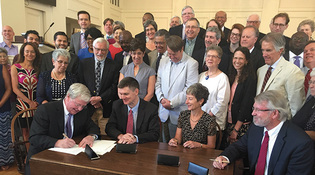 loading
loading
Light & VeritySeminary to affiliate with Divinity SchoolAndover Newton Theological School will move to New Haven.  Tom KrattenmakerMartin Copenhaver ’80MDiv of Andover Newton (left) signs the agreement as (left to right) Yale chief financial officer Stephen Murphy ’87, Andover Newton board chair Linda Campanella, and Yale Divinity dean Gregory Sterling look on. View full imageA year ago, the Yale Divinity School and the Andover Newton Theological School announced that they were working on a plan to bring Andover Newton from its Newton, Massachusetts, campus to Yale. In July, after a year in which four Andover Newton professors came to Yale under a visiting arrangement, the two schools signed an agreement to make it official. Beginning this fall, Andover Newton Seminary at Yale will be an affiliated institution at Yale Divinity School (YDS), offering a certificate program that trains ministers in Andover Newton’s particular protestant tradition. Students will apply to Yale Divinity School and receive their degrees from Yale, but they will be able to affiliate with Andover Newton, much as Episcopal students now affiliate with the Berkeley Divinity School at Yale. Andover Newton, whose roots as a seminary go back to 1807, has formal relationships with the United Church of Christ and the American Baptist Church; it also trains ministers in the Unitarian Universalist tradition. All are “congregational” denominations, whose local churches are largely autonomous. The new affiliation with Yale allows it to sell its campus and use the proceeds—and its existing endowment—to fund its operations at Yale and improve financial aid. “Independent theological schools are under a lot of stress,” says Andover Newton president Martin Copenhaver ’80MDiv, who will come to Yale as dean of the seminary. “One way schools respond is by broadening their mission. But this affiliation allows us to keep a laser focus on our historic mission: training ministers in the congregational tradition.” Copenhaver and YDS dean Gregory Sterling say the visiting year was a great success. The faculty were warmly welcomed, and a weekly worship-and-dinner event was well attended. “What was really gratifying was how quickly we were embraced by the YDS community,” says Copenhaver. “Folks at YDS seemed to understand what Andover Newton was bringing in a way that I thought would take much longer.” For Sterling, the new arrangement helps to fulfill two important Yale goals. First, Andover Newton’s endowment will support financial aid for its students, furthering YDS’s stated goal of being tuition-free for students with demonstrated need by 2022. Second, Andover Newton will attract more students interested in becoming ministers, a core mission of YDS but one that has lost some ground over the years. The seminary will have four full-time faculty, an alumni and development officer, and an administrative assistant. It will have space within the Sterling Divinity Quadrangle, but Copenhaver says Andover Newton will also buy a house adjacent to the campus as a student center. (Berkeley has a similar arrangement, with a house on St. Ronan Street.) Meanwhile, there will be one more year of instruction for Andover Newton’s remaining students at its campus in Massachusetts. So Copenhaver finds himself traveling between the two campuses for the next year. “I live on the Acela train,” he says, with a laugh. “I picked out a great seat and I’m decorating it now.”
The comment period has expired.
|
|